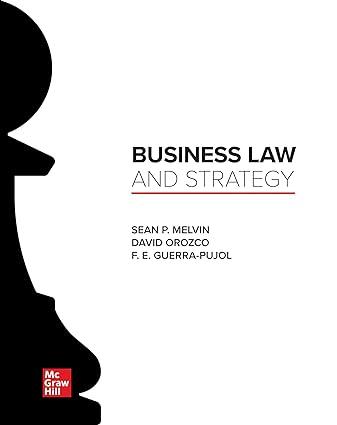Hebberd-Kulow Enterprises (HKE) sold agricultural supplies to Kelomar over a period of approximately 20 years between 1987
Question:
Hebberd-Kulow Enterprises (HKE) sold agricultural supplies to Kelomar over a period of approximately 20 years between 1987 and 2007. During that time, Kelomar routinely ordered products over the phone. In these phone calls, the parties’ representatives would discuss and agree to the type of item, its quantity, and its price. Kelomar provided HKE with a purchase order number for the requested items, but it never sent a formal purchase order document. After delivery of the items to Kelomar, HKE would send Kelomar an invoice that corresponded to the applicable purchase order number. In 2003, HKE began to include a provision for late payments on its invoices: “Unpaid invoices beyond terms will be assessed a monthly service charge of 1–1/2%.” According to HKE, the late penalty interest rate was standard in the industry. Although Kelomar often paid late, HKE never charged Kelomar interest on the late payments because of their long-term business relationship. HKE never informed Kelomar of the new provision and Kelomar never objected to it.
A dispute between the parties arose after HKE delivered approximately
$250,000 worth of goods in 2007. These goods were shipped separately with corresponding invoices. Kelomar refused to pay the invoices because it claimed to have incurred damages in a different set of contractual transactions with HKE that were unrelated to the $250,000 shipment. HKE sued for the price of the goods and also for late payment interest on the amount due based on the late payment provision included on the invoices. A jury awarded HKE damages for the unpaid 2007 invoices as well as for the late payment interest included on the invoices. Kelomar appealed, arguing, among other things, that the penalty interest was not part of the agreement under the UCC’s battle of the forms provision and that failing to enforce the late payment penalty in the past barred HKE from recovering it in this case.
The California Court of Appeals affirmed the jury’s award in favor of HKE. The court concluded that the jury had properly applied the battle of the forms standards in finding that the late payment penalty was part of the contract in the 2012 invoices, and the court rejected Kelomar’s argument that the interest language on the invoices, even if known to it, contained an additional term that would never be enforced because of their course of past dealing. The court pointed out that HKE established that Kelomar did not raise a timely objection to the interest provision and that such provision was a standard one in the industry that was not unexpected between merchants.
CASE QUESTIONS
1. Why didn’t HKE charge Kelomar the late interest charge until this dispute?
2. In your opinion, why did the court reject Kelomar’s argument that it was reasonable to think that HKE had waived the late interest charge and was barred from enforcing it? Should HKE be able to choose when it does and when it doesn’t enforce the clause?
Step by Step Answer:

Business Law And Strategy
ISBN: 9780077614683
1st Edition
Authors: Sean Melvin, David Orozco, F E Guerra Pujol





